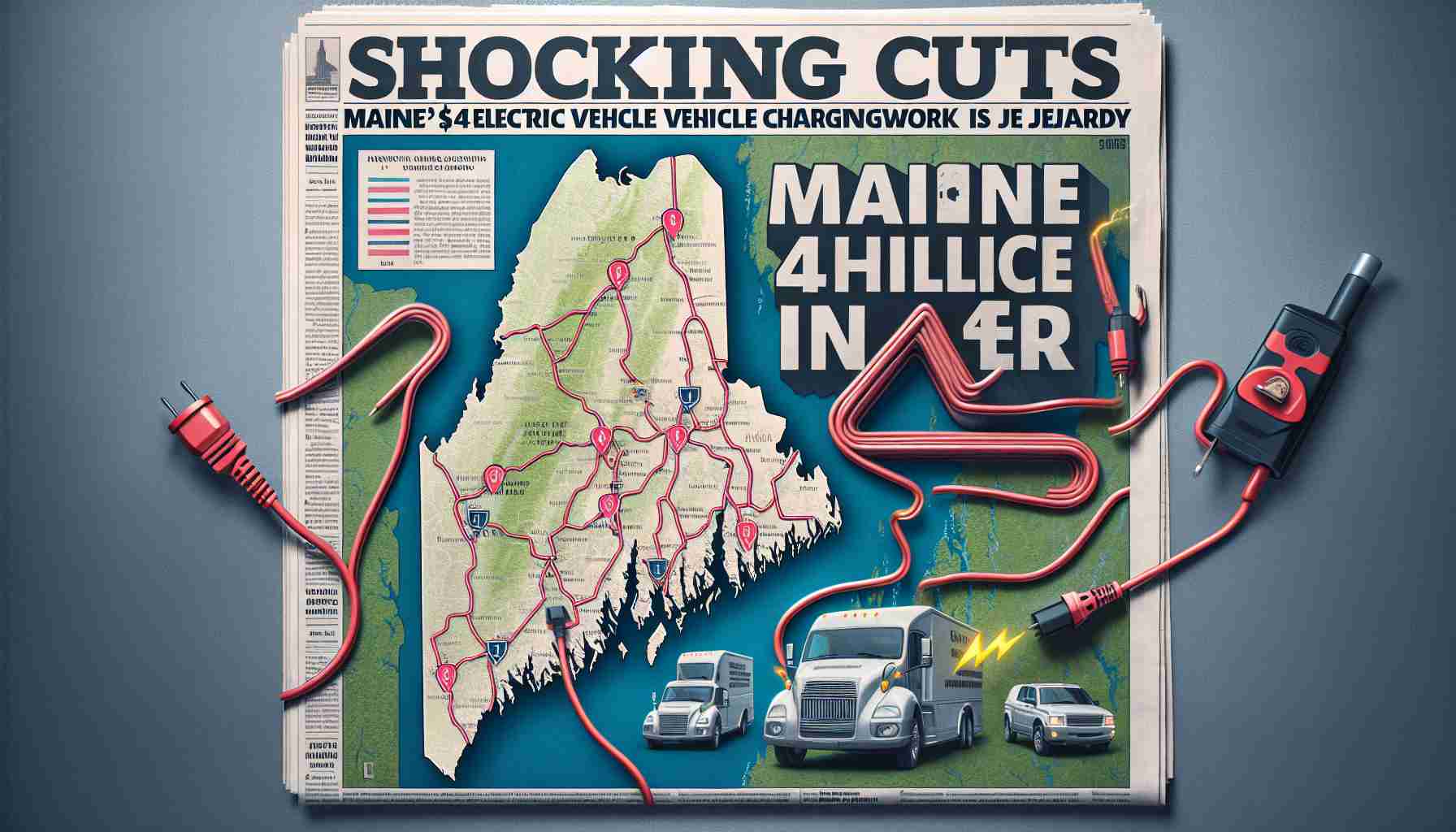- Federal funding for EV chargers in Maine has been halted, raising concerns over the state’s charging network plans.
- The Trump administration rescinded support for the National Vehicle Infrastructure program, jeopardizing $4 million for new EV charger installations in the state.
- Maine has secured $15 million for 13 charging sites, with some already operational.
- Governor Janet Mills aims to install 52 high-speed charging stations, targeting a 20-minute recharge time to combat “range anxiety.”
- Political controversies and criticisms about the state’s EV efforts are intensifying, especially regarding greenhouse gas reduction targets.
- The future of Maine’s EV infrastructure is uncertain, pending new guidance and funding opportunities.
In a stunning turn of events, federal funding aimed at expanding electric vehicle (EV) chargers has been halted, casting uncertainty over Maine’s ambitious plans to strengthen its charging network. The Trump administration recently rescinded support for the National Vehicle Infrastructure program, which had previously facilitated the funding of up to 80% of project costs for EV chargers. This move threatens approximately $4 million earmarked for new installations in the state.
Despite this funding setback, Maine has already secured $15 million from the program for 13 charging sites across the state, with some stations in Augusta and Rockland already operating. Maine’s Department of Transportation remains hopeful, waiting for new guidance from the U.S. Department of Transportation on additional NEVI funding, which is essential for ongoing projects.
Governor Janet Mills is pushing to install 52 high-speed charging stations at key locations, ensuring EV drivers can recharge in as little as 20 minutes. These stations aim to alleviate “range anxiety”—the fear of running out of power—especially in rural areas where infrastructure remains underdeveloped.
However, the context is fraught: political controversies swirl around the state’s electric vehicle initiatives, facing criticism from various sectors wary of the progress. Environmental advocates are stepping up, alleging the state isn’t meeting greenhouse gas reduction targets due to the lack of robust EV policies.
As Maine navigates this turbulent landscape, the future of its electric vehicle infrastructure hangs in the balance. Will they overcome these funding challenges and charge ahead, or will the dream of a comprehensive EV network slip away?
Funding Frustrations: Maine’s EV Charging Network on the Brink!
## The State of Maine’s Electric Vehicle Charging Network
Maine has been a burgeoning hub for electric vehicle (EV) infrastructure development, aiming to create a comprehensive network of charging stations across the state. However, recent turmoil regarding federal funding has created detrimental implications for future expansion plans, including the ambition to bolster high-speed charging options.
Current Landscape and Financial Challenges
In a surprising twist, the federal government recently halted funding for the National Vehicle Infrastructure program, a major facilitator for public EV charger installations. This decision retracts a substantial 80% funding support for new projects, leading to an uncertain future for $4 million previously allocated for Maine’s charger installations. Despite this setback, Maine has successfully utilized $15 million of prior funding to activate charging stations in 13 locations, including cities like Augusta and Rockland.
# Future Goals for Charging Infrastructure
Governor Janet Mills has ambitious plans to deploy 52 high-speed charging stations, strategically positioned to provide quick recharges for drivers in as little as 20 minutes. This initiative addresses prevalent concerns about “range anxiety,” especially in more remote regions with less-developed infrastructure.
Controversies Surrounding EV Initiatives
The political climate surrounding Maine’s EV strategy is complicated by controversies and critiques from multiple stakeholders. Environmental advocates criticize the state’s current approach, arguing that it fails to meet greenhouse gas reduction targets—a critical component of sustainable development. This criticism raises questions about the state’s commitment to improving energy efficiency and developing progressive climate policies.
Relevant Insights
1. Market Trends: The overall EV charging market is expected to grow significantly, with a projected CAGR of over 30% in the coming years, driven by increasing consumer demand and legislative support for sustainable transport solutions.
2. Technological Innovations: The rise of ultra-fast charging technologies is transforming the EV market, allowing for rapid turnarounds that may alleviate many consumer concerns associated with previous charging station limitations.
3. Sustainability and Security: As charging infrastructures expand, there is an increasing focus on the sustainability of materials used for chargers and the importance of cybersecurity measures to protect user data and infrastructure integrity.
Key Questions and Answers
# 1. What is the current status of EV charger installations in Maine?
Despite the cessation of federal funding, Maine has successfully implemented charging stations in 13 sites thanks to previously secured financing, with efforts continuing to incorporate more high-speed chargers.
# 2. How does the cessation of federal funding impact Maine’s EV infrastructure?
The recent rescinding of funding poses a significant obstacle, as Maine was relying on these financial resources for ongoing and future charging station projects, potentially stalling statewide growth in EV infrastructure.
# 3. What are the environmental implications of Maine’s EV initiatives?
Advocates argue that without a robust EV strategy aligned with greenhouse gas reduction goals, Maine risks falling short of its environmental targets, emphasizing the need for a comprehensive approach to sustainable energy and transportation policies.
For further updates on electric vehicle initiatives and infrastructure in the state, visit Maine Government.














